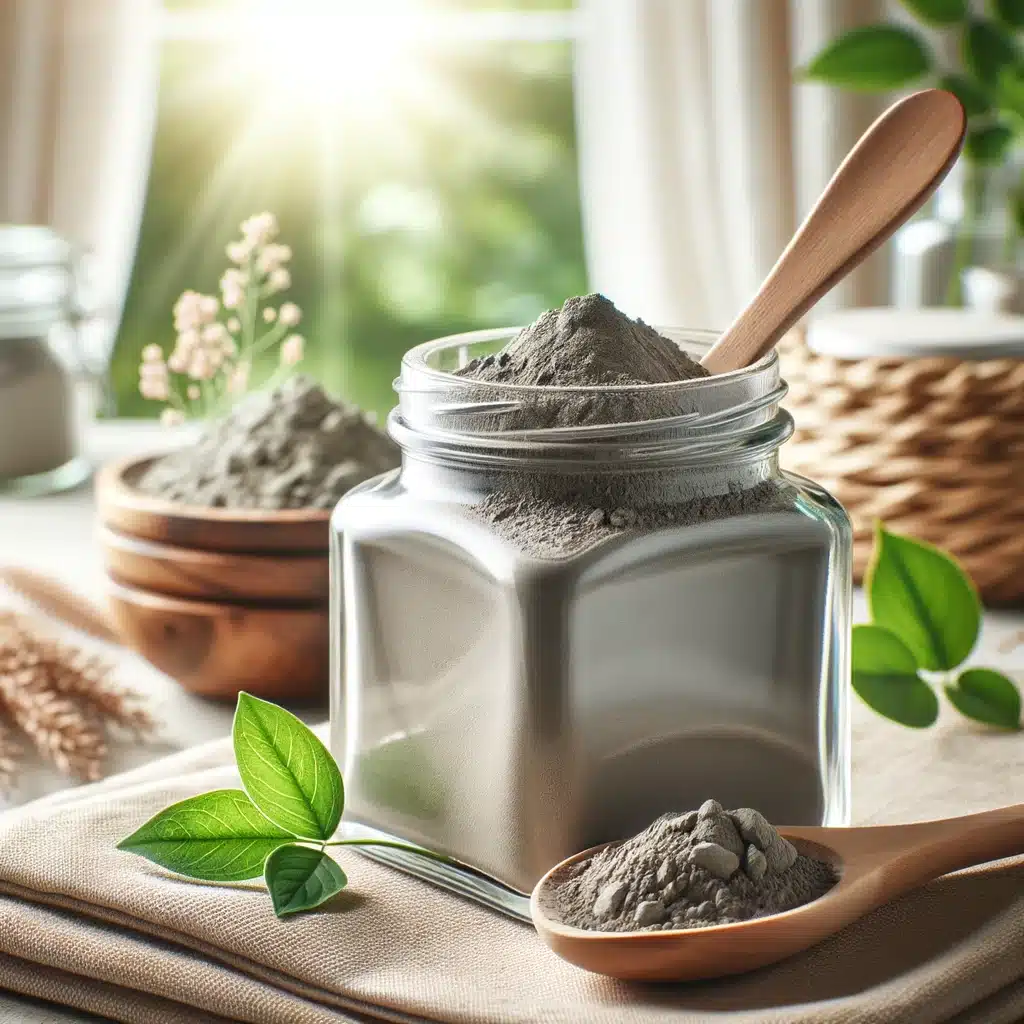Potassium Bentonite Clay Detox
A Comprehensive Guide
Introduction
Bentonite clay, derived from volcanic ash, is a versatile and natural substance known for its health benefits. There are different types of bentonite clay, including calcium bentonite and potassium bentonite. Both have unique properties and uses, particularly for detoxification and health improvement. This article delves into the properties, uses, and benefits of potassium bentonite clay, including its historical use for radiation detoxification.
What is Bentonite Clay?
Bentonite clay is formed from volcanic ash and is composed of montmorillonite. It has a unique structure that allows it to absorb and bind toxins, making it a powerful detoxifier.
Source and Origin of Bentonite Clay
Bentonite Clay, named after Fort Benton, Wyoming, is a type of absorbent clay formed from volcanic ash. Its primary component is montmorillonite, a mineral from the smectite group, known for its ability to swell when wet. Bentonite is generally classified into two main types based on the dominant cation: Sodium Bentonite and Calcium Bentonite. Each type has unique properties and uses, and their geographic origins also contribute to their specific characteristics.
Sodium Bentonite
Sodium Bentonite, often referred to as swelling bentonite, has a high capacity to absorb water, expanding up to several times its dry mass. This type is predominantly found in the United States, particularly in Wyoming, which holds around 70% of the world’s known supply. Sodium Bentonite’s high swelling ability makes it suitable for applications such as drilling mud for oil and gas wells, sealing ponds and landfills, and as a binding agent in various industrial processes. Its powerful adsorption properties make it ideal for detoxification treatments, both internally and externally (Wikipedia).
Calcium Bentonite
Calcium Bentonite, known as non-swelling bentonite, is more common globally. It can be found in regions such as the Montmorillon area in France, Greece, Turkey, India, and several other countries. This type of bentonite has a lower swelling capacity compared to sodium bentonite but is still highly effective in absorbing impurities. It is primarily used in applications requiring lower swelling, such as in skincare products, where its gentle nature makes it ideal for sensitive skin. Calcium Bentonite is also the main ingredient in Fuller’s Earth, historically used as an industrial cleaning agent.
Other Types of Bentonite
In addition to sodium and calcium bentonite, there are other types of bentonite that are identified based on the predominant cations present:
-
Potassium Bentonite (K-Bentonite): Found in regions like Italy and India, potassium bentonite is known for its non-swelling properties and is often used in ceramic production and as a filler in paints and coatings.
-
Aluminum Bentonite: This type is used in various cosmetic applications due to its fine texture and ability to absorb oils and impurities without causing irritation.
Global Deposits
Bentonite clay deposits are found worldwide, with significant sources in the United States, particularly in Wyoming, as well as in Greece, Italy, Japan, Brazil, Romania, Germany, Mexico, Argentina, Spain, India, Hungary, Poland, Canada, and Turkey. Each region’s bentonite clay can vary in composition, affecting its specific uses and benefits.
Uses and Benefits
Bentonite clay’s versatile nature makes it useful in numerous applications:
- Industrial: Used in drilling muds, foundry sand binders, and as a sealant for landfills.
- Cosmetics and Skincare: Utilized in face masks, creams, and detox baths for its ability to draw out toxins and impurities from the skin.
- Health and Detoxification: Taken internally to bind and remove toxins from the digestive tract, though care must be taken to use food-grade bentonite.
- Environmental Cleanup: Effective in adsorbing heavy metals and other contaminants from water sources, making it valuable in environmental remediation efforts.
Understanding the differences between these types of bentonite clay, their sources, and their unique properties can help you choose the most suitable type for your specific needs. Whether for industrial applications, skincare, or health benefits, bentonite clay offers a range of uses that leverage its natural ability to absorb and purify.
Historical Use and Radiation Detoxification
Bentonite clay has been used for centuries by various cultures for its healing properties. One notable use is in the aftermath of nuclear disasters like Fukushima and Chernobyl. Victims were given bentonite clay to help remove radioactive substances from their bodies. This is due to the clay’s ability to bind with toxins, including heavy metals and radioactive particles, and facilitate their removal from the body.
Health Benefits
1. Detoxification: Bentonite clay’s unique structure allows it to absorb toxins and impurities. When hydrated, it acts as a magnet, drawing out impurities from the body. This makes it effective in removing heavy metals, chemicals, and toxins.
2. Digestive Health: When ingested, bentonite clay can help with digestive issues by absorbing toxins and promoting a healthy gut environment. It has been used to treat conditions like irritable bowel syndrome (IBS), leaky gut, and constipation.
3. Skin Health: Topical application of bentonite clay can help with various skin issues, including acne, eczema, and dermatitis. Its antibacterial and anti-inflammatory properties soothe irritated skin and promote healing.
4. Immune Support: Bentonite clay supports the immune system by removing toxins that can weaken it. It also provides essential minerals that help maintain overall health.
5. Alkalizing Properties: The clay’s mineral content helps balance the body’s pH, promoting a more alkaline environment, which is beneficial for health.
Usage and Application
Internal Use:
-
- Detox Drink: Mix half a teaspoon of bentonite clay with water and drink once a day. Ensure it’s food-grade clay.
-
- Digestive Health: Take on an empty stomach to help with digestive issues.
External Use:
-
- Clay Mask: Mix with water to form a paste and apply to the skin to help with acne and other skin conditions.
-
- Bath Soak: Add to bathwater to help with detoxification and improve skin health.
Animal Use
Bentonite clay is also consumed by animals in the wild when they are sick. Parrots, monkeys, tigers, and wolves have been observed seeking out clay to ingest. They often combine it with fasting and increased water intake to cleanse their systems naturally.
How It Works
The effectiveness of bentonite clay lies in its physical structure. The clay particles are flat and have a large surface area. When hydrated, they swell and create a charge that attracts and binds toxins. This mechanism allows the clay to effectively remove impurities from the body, promoting overall health.
Conclusion
Potassium bentonite clay, like its calcium counterpart, offers numerous health benefits due to its ability to detoxify and provide essential minerals. Its historical use for radiation detoxification highlights its powerful binding properties. Whether used internally or externally, bentonite clay can be a valuable addition to your health regimen. Always ensure that the clay is food-grade if ingested and consult with a healthcare provider if you have any concerns. I personally use this bentonite clay in my water and in my masks; I have an Amazon affiliate relationship where I may earn a commission if you make a purchase.
Free Monthly Newsletter
You’ll find healthy tips, detox guides, diet concepts, meal plans, free (sustainable product) sample alerts, how-to’s, video Yoga classes and more all for free!
This EmailOctopus form cannot be rendered.

Recent Posts
- Did Celebrities Secretly Use This Natural Detox Cleanse? December 15, 2024
- Prekese – For Mind, Body and Soul September 30, 2024
- The Magical Moringa Tree: A Treasure in Ghana August 7, 2024
- Neuroprotection with Low-Dose Methylene Blue and Near-Infrared Light July 30, 2024
- Effective 7-Day Weight Loss Meal Plan With Delicious Recipes July 18, 2024
